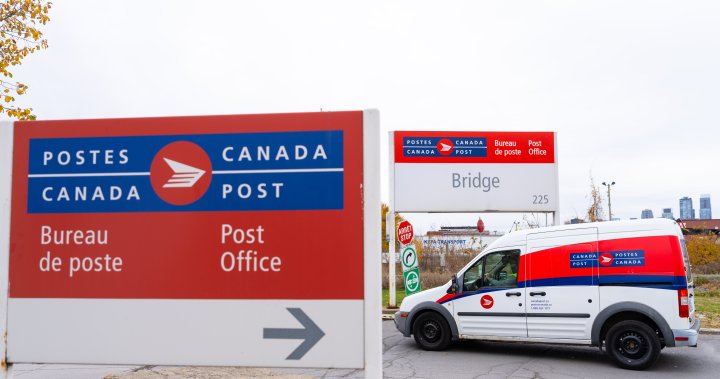Canada Post and its workers’ union remain at odds in their labour negotiations as a potential strike looms, threatening to disrupt mail service for millions of Canadians.
Canada Post told Global News in an emailed statement Monday night that weekend talks with the Canadian Union of Postal Workers (CUPW) were “unfortunately less productive” than the Crown corporation had hoped for.
The union is in a legal strike position as of Sunday after a cooling-off period in the contract talks ended the day before, but has yet to issue a strike notice.
“At this time, neither party has provided notice (minimum 72 hours) of their intent to start a labour disruption,” said Lisa Liu, a Canada Post spokesperson.
While both parties are still negotiating, the union said Monday that “if there is no real movement at the bargaining table, we won’t shy away from taking the next step.”
The threat of a labour disruption ahead of the busy holiday season has already had a “serious effect” on business as customers look for other delivery options, putting further financial strain on the company, Canada Post said.
“Retailers require certainty for their shipments at this critical time of year and are moving their parcels to other delivery companies,” Liu said.
“Customers have also cancelled direct marketing campaigns to avoid having items stuck in the postal network in the event of a strike. Our overall volumes are down significantly and continue to erode.”

What are the main sticking points?
For almost a year, the CUPW has been bargaining new contracts for the urban operations unit and the rural and suburban mail carriers (RSMC) unit.
The two sides have been negotiating since November last year. In September, Canada Post presented its proposal and the union came up with its counter-offers last month.

Get daily National news
Get the day’s top news, political, economic, and current affairs headlines, delivered to your inbox once a day.
Last week, Canada Post presented its latest offers to the CUPW, including higher annual wage increases amounting to 11.5 per cent over four years and protections for workers’ pensions. The new proposal also included enhanced leave entitlements and job security provisions.
In an initial review of that proposal, the union said the offers “fall short.”
As things stand, both parties are not seeing eye to eye on two key issues: weekend delivery and a short-term disability plan, among other sticking points.
Canada Post says it’s negotiating a “more flexible delivery model” that would allow affordable parcel delivery seven days a week.
The union is not convinced that this plan will protect workers’ regular full-time routes on weekdays.

On short-term disability, CUPW is demanding to include 10 medical days and seven personal days in the collective agreements, but Canada Post refuses to budge from 13 personal days, the union said.
Pensions and access to essential benefits are other hurdles to reaching an agreement.
In a statement to Global News on Tuesday, CUPW spokesperson Siân Griffiths said Canada Post is “pushing to weaken our pensions, not just for current members but for future generations as well. They also want to make it harder for postal workers, who put their health on the line daily, to access essential benefits.”
What could job action look like?
While neither side has issued a notice of labour disruption, a potential job action could impact Canadians across the country.
On previous occasions, Canada Post has done rotating strikes so there is minimal impact on customers, CUPW national president Jan Simpson told Global News last Thursday.
There is also the option for a full-out strike, she said, as well as Canada Post locking out workers and closing the business down completely.
The federal government has urged both parties to reach a collective agreement and is working to facilitate that outcome.
Labour Minister Steve MacKinnon met with Canada Post and CUPW on Thursday.
He told reporters on Wednesday: “We’re obviously active in trying to facilitate a collective agreement and we want the two parties to agree and for that agreement to be ratified.”
MacKinnon did not say if the federal government would intervene.

If a strike goes ahead, it’s not clear if the Liberal minority government will be able to legislate an end to the work stoppage.
The New Democratic Party, for one, will not support it.
“There is not a scenario where we’ll be supporting back-to-work legislation,” Matthew Green, the NDP’s labour critic, said in an interview with Global News on Friday.
“It’s incumbent on the labour minister to not use the threat of legislating Canada Post back to work to basically take management off the hook from negotiating a fair deal with these workers.”
He added that all options need to be explored and that the “best deals” are reached at the bargaining table.
The labour dispute comes as Canada Post is struggling to stay afloat amid financial losses.
Canada Post says it recorded $490 million in losses from operations in the first half of the year and since 2018, it has lost more than $3 billion.
“We remain hopeful that further discussions will afford a breakthrough, but urgency is now required,” Liu said.
“Our deteriorating financial situation could require the company to revisit its proposals. “
— with files from The Canadian Press
© 2024 Global News, a division of Corus Entertainment Inc.





